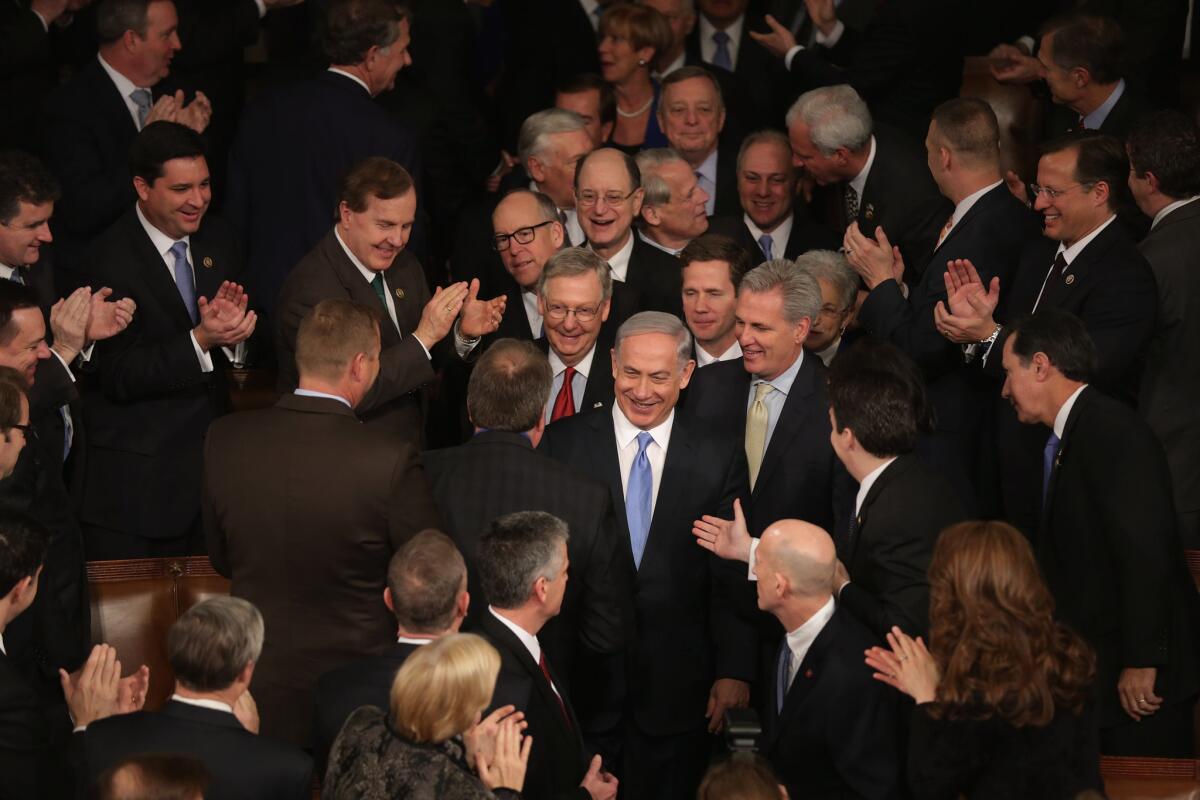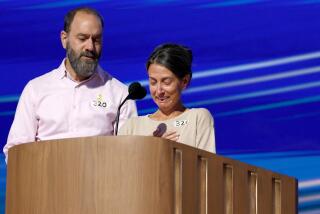Netanyahu’s speech elicits praise, frustration from Congress members

- Share via
For a speech about which there was much controversy among Democrats, Prime Minister Benjamin Netanyahu’s first applause line was reserved for an unlikely recipient: Harry Reid, the top Senate Democrat, whom he praised for a quick recovery from a recent injury.
Democrats were quick to rise to their feet then, as they were at various points during his speech. But at other times their reaction was more tentative, and in some cases frustration was evident.
Rep. Nancy Pelosi (D-San Francisco), the House minority leader, did little to contain her disagreement with specific arguments Netanyahu made, often turning to those around her to respond. At one point a colleague, Rep. Alcee Hastings (D-Fla.), grasped Pelosi by the shoulders, seemingly trying to contain her.
When Netanyahu railed against what he considered to be a “bad deal” with Iran, Pelosi remained seated and threw up her hands. But two rows in front of her, Sen. Chuck Schumer (D-N.Y.) and Robert Menendez (D-N.J.) stood and applauded with the rest of the Republican-dominated audience.
When Netanyahu concluded his remarks, Senate Majority Leader Mitch McConnell (R-Ky.) pumped his fists in the air in support. Others rushed to the aisles to try and greet Netanyahu as he exited. But Pelosi quickly marched to the rear of the House chamber to leave.
“You have to know Nancy. She’s an opinionated person,” said Rep. Brad Sherman (D-Sherman Oaks), who was seated near his fellow Californian. “Sometimes she agreed, sometimes she disagreed, sometimes she had an important point to add.”
Many Democrats – at least a quarter of those in the House and eight senators, according to one estimate from The Hill newspaper – skipped the speech.
But every seat in the chamber was full, and some members had to stand throughout as some former members of Congress, including Michele Bachmann and now-Ohio Gov. John Kasich, joined ex-colleagues.
According to aides to House Speaker John A. Boehner (R-Ohio), the number of requests for seats in the gallery was 10 times the number of available seats.
Seated in the row with Boehner’s wife in the gallery were former Speaker Newt Gingrich and his wife, as well as casino magnate Sheldon Adelson, a top GOP donor. Across the chamber, where the first lady and her guests would be seated at a State of the Union address, Netanyahu’s wife sat with Holocaust survivor Elie Wiesel, a row in front of New England Patriots owner Bob Kraft.
Democrats who skipped the speech to protest how it had been politicized said they felt validated after hearing Netanyahu’s comments.
Rep. John Yarmuth, a Jewish Democrat from Kentucky, criticized Netanyahu for what he considered condescending remarks, saying he “was telling us how to negotiate.”
“This speech was straight out of the Dick Cheney playbook. This was fear-mongering at its ultimate,” he said at a news conference.
Rep. Jan Schakowsky (D-Ill.) said she read quotes from Netanyahu as a private citizen before the start of the Iraq war and heard today another effort to “stampede” the U.S. into war.
“The White House needs to keep its eye on the ball,” Rep. Jared Huffman (D-San Rafael) said when asked whether the White House needed to counter the speech.
Sherman, who was appointed to be among a group of lawmakers who escorted Netanyahu into the chamber, praised the prime minister for, in his view, diffusing some of the political tension.
He “did a spectacular job” of laying out the stakes for Israel if Iran were to attain nuclear weapons, Sherman said, but noted that the shortest portion of his speech was how to “insist on a better deal.”
Now, Sherman said, President Obama has a responsibility to make his case.
“Public opinion will affect what he does this month and Congress will critique what he does next month,” Sherman said. “If it’s a great deal, we might actually pass legislation that reduces sanctions. … If it’s a bad deal, we might pass additional sanctions and put them on the president’s desk.”
Former Sen. Norm Coleman (R-Minn.), who also attended, said he hoped Obama would not view this moment as a “chess match” in which he needs to respond to Netanyahu’s move.
“The logic of this speech was very powerful. So rather than the president counter, I hope the president would listen,” he said.
Follow @mikememoli for more news out of Washington
More to Read
Get the L.A. Times Politics newsletter
Deeply reported insights into legislation, politics and policy from Sacramento, Washington and beyond. In your inbox three times per week.
You may occasionally receive promotional content from the Los Angeles Times.











